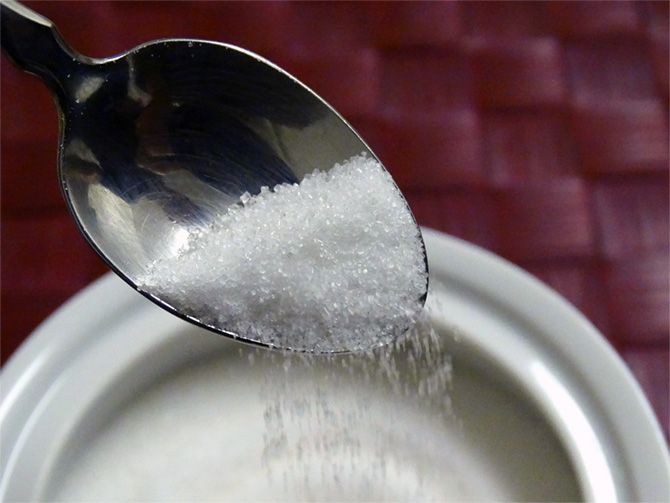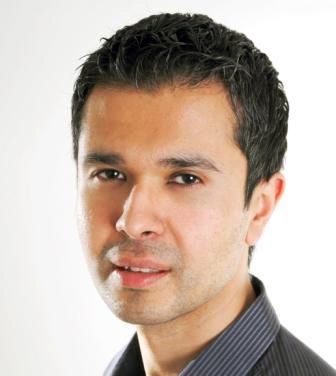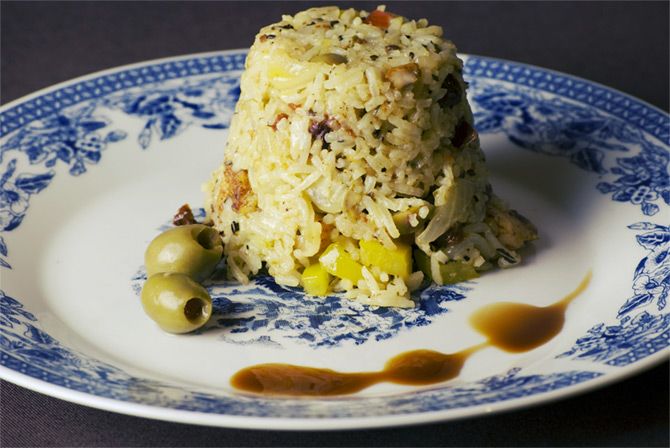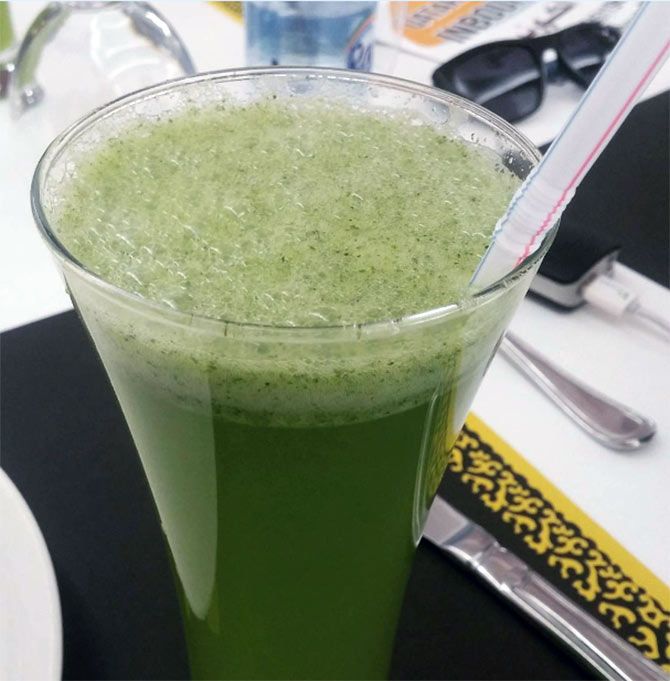 | « Back to article | Print this article |
'When I give advice to my Indian relatives they are shocked.'
'I tell them to eat butter again and eggs and all that stuff.'
And eat only so much rice.'
'Instead of having three chapattis, have one.'
A must-read interview!

When Dr Aseem Malhotra was training as an interventionist cardiologist at a London borough hospital six years ago, a cardiac case came in, in the middle of the night.
The next morning when he went to check on the patient, on his ward rounds, and offer him some dietary advice, the patient was being, to his horror, served a plate of burger and fries by the hospital.
It was a sharp moment of epiphany for Dr Malhotra, left, below.
The patient said to him, 'This is a sad reality. How do you expect me to improve my health, if you are serving me the same crap that brought me here in the first place?'
That's when the Manchester-raised Malhotra, 38 -- whose parents are GPs, he studied at the Edinburgh University Medical School -- started up, with gusto, a researched, informed campaign to bring further awareness on diet to his patients, the medical fraternity and the public as a cardiologist.
He began by looking inwards, at his own health first.
Dr Malhotra was perturbed to discover that he was something of a sugar addict.
"I used to get through 40 teaspoons a day. It is not difficult to do that!"
"Early in the morning: Orange juice," he explains. "Go to the gym. Lucozade. I would have lunch, that would be pasta and a panini. Go have a chocolate mocha coffee. Then I would have whatever was my next carbohydrate fix. I would in the evening cook my chicken curry or pav bhaji or whatever. And then I would have my chocolate cake before going to sleep. This was a regular routine for me, over the years. So when you (total) up all the added sugar, there was about 40 teaspoons easily, probably, close to that."
Dr Malhotra spent many days, he says, assiduously poring over hundreds and hundreds of research papers, unraveling the complicated conflict of interest angles, looking at what were likely to be the reliable studies and what were likely to be unreliable on diet, its relation to health and its care.
He examined the financial interests involved and how that "fitted into the grand scheme of things. All of that came together for me to have a realisation."
Many factors added up pretty quickly and shockingly, for the Dr Malhotra, to dramatically indicate what could be wrong with popular and established strategies to combat heart disease, vascular disease and diabetes.
The main being:
The cardiologist wasted no time in marshalling all the facts to present a strong case to the public, and make some noise about it, so doctors and patients could critically rethink their dietary advice and regimes.
Over the last few years, the outspoken Dr Malhotra, in addition to working in London as a cardiologist with Britain's National Health Service and a consultant clinical associate to the Academy of Medical Royal Colleges, fights hard through various action groups, like his own Action on Sugar, to make the most strident impact speaking and widely promoting what he feels people really need to eat.
His powerful message is slowly percolating and in the bargain pushing several hot buttons.
Last year the outspoken award-winning doctor, now firmly an egg-slice-of-cheese-buttered toast-in-the-morning-no-cereal-and-juice-thank-you man, was named one of the most influential people in medicine and science in Britain by celebrity register Debrett's and the youngest person to be appointed to the board of trustees of UK think tank The King's Fund.
May 23, Dr Malhotra and a group of medics, who are behind the charity National Obesity Forum and the Public Health Collaboration, released a report accusing Britain's public health organisations of being in cahoots with the food industry in offering wrong advice on low-fat diets and cholesterol and asked for a complete revamp in official dietary guidelines.
The chief knowledge officer of the British-government run Public Health England has come back with a rebuttal and the battle for fat and cholesterol is heating up, sizzling, in fact.
In an interview, over the phone to Vaihayasi Pande Daniel/Rediff.com, Dr Malhotra busts health-and-nutrition myth after myth and speaks specifically about how Indians and people of Indian heritage need to watch their diet.
Read on!
As a non-medical person, it is very confusing to read about what you or your family should eat or not. What is the simplest, most common sensical diet regimen I can advise my young, nearly-adult daughters, so they can go on to lead healthy lives?
The first thing to say is what you shouldn't eat, what is not conducive to good health. And what is harmful.
Sugar is one of the only foods we ingest that directly corrodes teeth.
Tooth decay is one of the most common causes of chronic pain in the UK.
There is no dietary biological requirement for added sugar whatsoever. No nutritional value. It is not a nutrient essential for life.
(First) cut out or reduce sugar. That doesn't mean you can't have an occasional mithai.
But having sugar is not part of a healthy diet. It should be looked as a treat.
It is like saying that a cigarette can be part of healthy lifestyle.
After that?
Then you get to something that has no evidence of doing any good and only potential harm -- it is very clear that we have got that from vegetable oil.
Avoid any (processed) vegetable oil.
Then avoid anything which is marketed that says it lowers cholesterol. This is science. This is not opinion.
If you look at the data -- other than statin drugs, and even that's being questioned -- there is no good, rigorous trial that has shown a reduction in cholesterol, through dietary mechanism, has ever translated into any benefit (and prevented) heart attack, stroke or death. No dietary trial has done that.
This obsession with cholesterol has led to the obsession with saturated fat.
People have got this worry and concern, that I can't have fat, I will get cholesterol.
It is just brilliant marketing... If you are over sixty, cholesterol is not associated with premature mortality or cardiovascular death.
The higher you are on the bad cholesterol, if you are over sixty, the less likely you are to die.
That is because cholesterol is one of the most vital molecules in the body.
You need it for so many functions. For hormone functions. It is needed for brain development. It is very important in the immune system. It very good to have because it is protective against cancer.
These things are forgotten because of the whole focus on heart disease.
The risk has been grossly, grossly exaggerated. And that's very unfortunate.
It's driven a market of low-fat food and it has driven a multi-billion dollar industry of people taking statin drugs.
 So the cornerstones of a healthy lifestyle/diet in your view is first avoid sugar and vegetable oils, don't listen to anti-cholesterol and anti-saturated fat propaganda. And?
So the cornerstones of a healthy lifestyle/diet in your view is first avoid sugar and vegetable oils, don't listen to anti-cholesterol and anti-saturated fat propaganda. And?
Avoid refined carbohydrates as well. Eat whole foods.
People have to start thinking about: How is what I am putting in my mouth affecting my brain, my body, my sense of well being, my energy, my risk of disease. We have to change the mindset, start thinking.
Even the father of modern medicine, Hippocrates, said let food be thy medicine and medicine thy food. This actually true because if you look at the global burden of diseases, poor diet contributes to more disease and death than physical inactivity, smoking and alcohol combined now…
People are too focused on weight and that inactivity leads to obesity. I wrote an article in The Washington Post, a few years ago, that we have to dissociate the word obesity and physical inactivity. No link at all. It is complete nonsense.
Everything to do with obesity is related to diet. That doesn't mean that being exercised is not good for you. Exercise has unbelievable health benefit...
So excessive weight gain comes from sugar?
No, I am not saying that. This is also a misconception. We are not talking about weight gain.
There is no such thing as a healthy weight. It doesn't exist. Only a healthy person.
(With respect to) the so-called healthy weight body mass index -- and this is very relevant to Indian population -- up to 40 percent people with normal BMI have the same metabolic abnormalities or conditions as people with obesity.
And Indians are particularly vulnerable -- South Asians -- because of that visceral fat, this kind of fat around the belly, the fat man with skinny legs if you like!
India has a very low prevalence of obesity, about 2.7 percent of the population; yet its type 2 diabetes prevalence is the second highest in the world.
This is not about weight. This is about health.
We have to completely change out mindset here.
That doesn't mean that people who are overweight or obese aren't at risk. Of course, there is a gradation of risk.
But we are not concentrating on the ultimate cause... What is the root cause that is driving all of these diseases. It is not obesity. It is insulin resistance.
Since you we were talking about refined carbs, what about rice and homemade bread and things that people have been eating traditionally?
Type 2 diabetes is a condition of carbohydrate intolerance. This is a disease that people should not take lightly.
If you are type 2 diabetic, in India, you are going to die ten years younger than someone who isn't type 2 diabetic.
Not only that you have increased risk of Alzheimer's, you have increased risk of depression, multi-organ system disease.
The other thing is, it is preventable and reversible.
People have this mentality in India "Oh diabetes. Oh ya. Runs in the family." This is a really harmful message.

You need to have the refined carbohydrates you are having in small quantities. Indians need to have a more traditional Indian diet, which is basically cooking in ghee and butter. It is not harmful to your health. It is probably beneficial.
Now if you are type 2 diabetic, you should control your type 2 diabetes and reduce the need for medication, which is by the way useless in preventing premature death and gives you side effects.
When I give advice to my Indian relatives they are shocked. I tell them to eat butter again and eggs and all that stuff. And eat (only) so much rice. Instead of having three chapattis, have one. There is a nuance here.
Listen, I grew up on chapattis. I haven't had chapattis for god knows how long because I know I am at risk.
I make cauliflower rice instead of white rice. (These changes) will take time. I am not overweight. But I am at risk.
Because of my parents there is a family history, risk of having belly fat, which I have had in the past, despite being a sportsman, captaining cricket teams and being very active (at one time Malhotra was choosing between becoming a professional cricketer and medicine), I have had this belly fat. Because I know that insulin resistance is an issue and refined carbohydrates for me are not good.
For Indians in particular, sugar is one of the worst culprits.

Also fruit juice should be considered a health hazard. Yes, fresh juice. This is not just my opinion. The World Health Organization gives the maximum of what we consider free sugar, that includes fruit juice.
One more serving of fruit juice can go over your daily limit already. It is liquid sugar. There are very little redeeming features. Vitamin C you can get from all sorts of other sources.
(With juice) you have liquid sugar heading to your liver, your glucose, your insulin. Even if you drink fresh juice, because you strip the fiber out. Fruit is fine. I wouldn't make it into juice.
But if you grind it and drink it with the fiber? Still?
Yes, it does because you are taking the fiber out.
But you are keeping the fiber?/p>
But it is the way you are drinking it. The way the body absorbs it. It absorbs it very quickly (if it is juiced). If you are having a glass of orange juice, freshly squeezed -- by the way I ordered a juicer two years ago and I have not used it because I know it is a health hazard. I used to gorge on this juice stuff (before).
It is absolutely detrimental to your health. People need to know this. There is a documentary -- and I was involved with it -- explaining exactly why this is.
If you think about a glass of orange juice... think about how many oranges you are squeezing into that? Five? Try and eat four or five oranges.
Also, you don't feel full (when you drink the juice). You got the fiber when you are chewing it, when it goes into your body and the way your body deals with it.
If you are Indian, I would recommend no more than two portions, three maximum of fruit a day. One portion is one orange. So think about it you are already having four or five oranges in one juice.